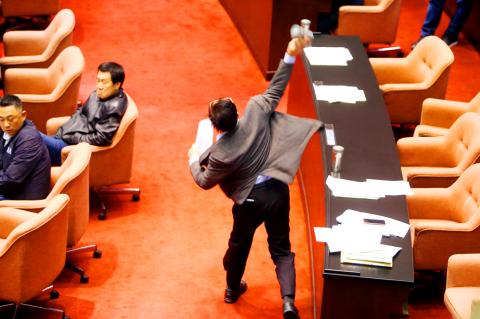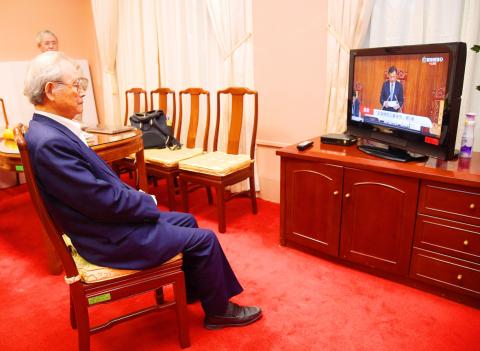The Act on Promoting Transitional Justice (促進轉型正義條例), which aims to remove authoritarian-era symbols and retry cases of injustice from that era, was passed by the Legislative Yuan yesterday evening.
The act is aimed at addressing injustices perpetrated by then-Chinese Nationalist Party (KMT) government between Aug. 15, 1945, when the Japanese government announced it had surrendered, to Nov. 6, 1992, when the Period of National Mobilization against Communist Rebellion ended in Kinmen and Lienchiang counties.
A nine-member Transitional Justice Promotion Committee is to be created, to be overseen by the Executive Yuan, with its chairman nominated by the premier and approved by at least half of the members of the Legislative Yuan.

Photo: CNA
The committee is also to address and utilize ill-gotten political party assets, but its purview will not include items already covered by the Act Governing the Handling of Ill-gotten Properties by Political Parties and Their Affiliate Organizations (政黨及其附隨組織不當取得財產處理).
The new act states that data unconstitutionally seized during the authoritarian era are to be collated and archived and made available for research and educational purposes as long as people mentioned in the data have their privacy and their freedom of communication protected.
Authoritarian symbols commemorating dictators that are publicly displayed are to be removed, renamed or addressed by other means as a way of upholding the nation’s free and democratic constitutional system.

Photo: Huang Yao-cheng, Taipei Times
Criminal cases found to have been unjustly adjudicated on are to be reinvestigated by the committee, with defendants granted retrial. People found responsible for mistrials are to be held accountable and required to compensate defendants and their family members as well as to take measures to restore their reputations.
Political parties, their affiliates and organizations they operate are to report to the committee any political files in their possession which, if necessary, are to be transferred to the government and archived.
Those that fail to do so could be fined between NT$1 million and NT$5 million (US$33,341 and US$166,705) and could be subject to repeated fines.
People found guilty of disposing of, sabotaging or concealing political data owned by political parties or their affiliated organizations could face prison sentences of up to five years.
People who object to rulings by the committee would have one month to request a reinvestigation and two months to initiate an administrative lawsuit.
Chinese Nationalist Party (KMT) lawmakers said the Democratic Progressive Party (DPP) has undermined the nation’s political system by creating an agency with administrative, judicial and investigative powers.
The passage of the act heralds the dawning of a new authoritarian era, KMT Legislator Lai Shyh-bao (賴士葆) said.
The act clearly targets the KMT and overlooks atrocities perpetrated by the Japanese colonial government, he said.
“When the KMT regains political power, we will also propose a transitional justice bill targeting [President] Tsai’s [Ing-wen, 蔡英文] authoritarian rule,” he said.
Non-Partisan Solidarity Union Legislator May Chin (高金素梅) and New Power Party Legislator Kawlo Iyun Pacidal panned the act for not requiring the government to relinquish Aboriginal lands once held by the Japanese colonial government.
However, DPP Legislator Wang Ding-yu (王定宇) said the act “opened a new frontier” for victims of the authoritarian era, as the government can now legally investigate data from that period, seek out and punish perpetrators of injustice as well as compensate the era’s victims and restore their dignity.
This story has been updated since it was first published.

CHAOS: Iranians took to the streets playing celebratory music after reports of Khamenei’s death on Saturday, while mourners also gathered in Tehran yesterday Iranian Supreme Leader Ayatollah Ali Khamenei was killed in a major attack on Iran launched by Israel and the US, throwing the future of the Islamic republic into doubt and raising the risk of regional instability. Iranian state television and the state-run IRNA news agency announced the 86-year-old’s death early yesterday. US President Donald Trump said it gave Iranians their “greatest chance” to “take back” their country. The announcements came after a joint US and Israeli aerial bombardment that targeted Iranian military and governmental sites. Trump said the “heavy and pinpoint bombing” would continue through the week or as long

TRUST: The KMT said it respected the US’ timing and considerations, and hoped it would continue to honor its commitments to helping Taiwan bolster its defenses and deterrence US President Donald Trump is delaying a multibillion-dollar arms sale to Taiwan to ensure his visit to Beijing is successful, a New York Times report said. The weapons sales package has stalled in the US Department of State, the report said, citing US officials it did not identify. The White House has told agencies not to push forward ahead of Trump’s meeting with Chinese President Xi Jinping (習近平), it said. The two last month held a phone call to discuss trade and geopolitical flashpoints ahead of the summit. Xi raised the Taiwan issue and urged the US to handle arms sales to

State-run CPC Corp, Taiwan (CPC, 台灣中油) yesterday said that it had confirmed on Saturday night with its liquefied natural gas (LNG) and crude oil suppliers that shipments are proceeding as scheduled and that domestic supplies remain unaffected. The CPC yesterday announced the gasoline and diesel prices will rise by NT$0.2 and NT$0.4 per liter, respectively, starting Monday, citing Middle East tensions and blizzards in the eastern United States. CPC also iterated it has been reducing the proportion of crude oil imports from the Middle East and diversifying its supply sources in the past few years in response to geopolitical risks, expanding

Pro-democracy media tycoon Jimmy Lai’s (黎智英) fraud conviction and prison sentence were yesterday overturned by a Hong Kong court, in a surprise legal decision that comes soon after Lai was jailed for 20 years on a separate national security charge. Judges Jeremy Poon (潘兆初), Anthea Pang (彭寶琴) and Derek Pang (彭偉昌) said in the judgement that they allowed the appeal from Lai, and another defendant in the case, to proceed, as a lower court judge had “erred.” “The Court of Appeal gave them leave to appeal against their conviction, allowed their appeals, quashed the convictions and set aside the sentences,” the judges